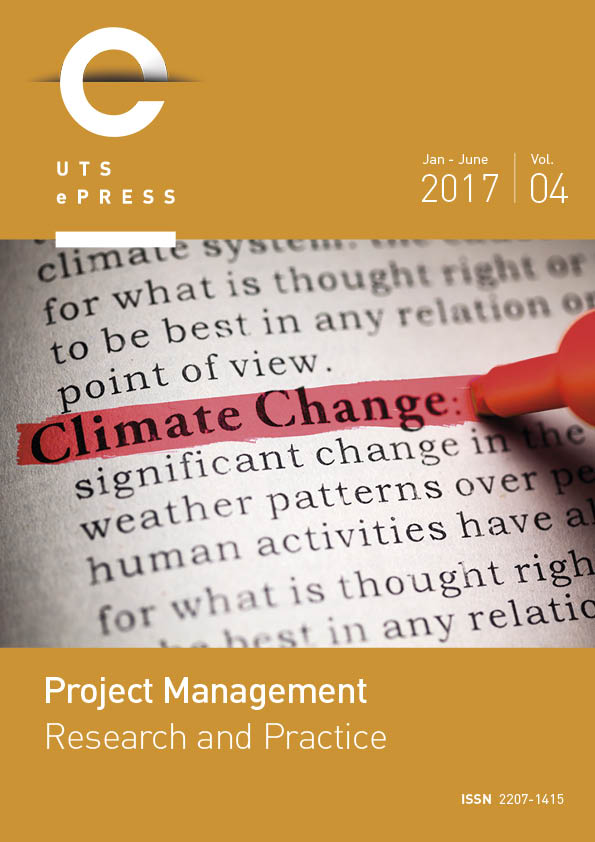We need to use the words...
Main Article Content
Abstract
conversation started a long time ago using those words, and PMRP would like to encourage more with this commentary on one of the central topics of this journal … climate change.
Article Details
Issue
Section
Authors who publish with this journal agree to the following terms:
a) Authors retain copyright and grant the journal right of first publication with the work simultaneously licensed under a Creative Commons Attribution License that allows others to share and adapt the work with an acknowledgement of the work's authorship and initial publication in this journal.
b) Authors are able to enter into separate, additional contractual arrangements for the non-exclusive distribution of the journal's published version of the work (e.g., post it to an institutional repository or publish it in a book), with an acknowledgement of its initial publication in this journal.
c) Authors are permitted and encouraged to post their work online (e.g., in institutional repositories or on their website) prior to and during the submission process, as it can lead to productive exchanges, as well as earlier and greater citation of published work (See The Open Access Citation Advantage Service). Where authors include such a work in an institutional repository or on their website (ie. a copy of a work which has been published in a UTS ePRESS journal, or a pre-print or post-print version of that work), we request that they include a statement that acknowledges the UTS ePRESS publication including the name of the journal, the volume number and a web-link to the journal item.
d) Authors should be aware that the Creative Commons Attribution (CC-BY) License permits readers to share (copy and redistribute the work in any medium or format) and adapt (remix, transform, and build upon the work) for any purpose, even commercially, provided they also give appropriate credit to the work, provide a link to the license, and indicate if changes were made. They may do these things in any reasonable manner, but not in any way that suggests you or your publisher endorses their use.
References
Ahadzie, D.K., Proverbs, D.G., & Sarkodie-Poku, I. 2014, ‘Competencies required of project managers at the design phase of mass house building projects’, International Journal of Project Management, vol. 32 no. 6, 958-969, http://dx.doi.org/10.1016/j.ijproman.2013.10.015
Geraldi, J. & Söderlund, J. 2016, ‘Project studies and engaged scholarship: Directions towards contextualized and reflexive research on projects’, International Journal of Managing Projects in Business, vol. 9 no. 4, 767-797, https://doi.org/10.1108/IJMPB-02-2016-0016
GPM 2014, The GPM global P5 standard for sustainability in project management (1st ed.). USA: GPM Global.
IPMA 2015, Individual competence baseline for PPPM (4th ed.). Zurich, Switzerland: International Project Management Association.
Kim, K.N. & Choi, J. 2013, ‘Breaking the vicious cycle of flood disasters: Goals of project management in post-disaster rebuild projects’, International Journal of Project Management, vol. 31 no. 1, 147-160, http://dx.doi.org/10.1016/j.ijproman.2012.03.001
Klakegg, O.J. & Haavaldsen, T. 2011, ‘Governance of major public investment projects: In pursuit of relevance and sustainability’, International Journal of Managing Projects in Business, vol. 4 no. 1, 157-167, https://doi.org/10.1108/17538371111096953
Konstantinou, E. 2015, ‘Professionalism in project management: Redefining the role of the project practitioner’, Project Management Journal, vol. 46 no. 2, 21-35, https://doi.org/10.1002/pmj.21481
Laszlo, E. 1991, ‘Responsible (project) management in an unstable world’, International Journal of Project Management, vol. 9 no. 2, 68-70, https://doi.org/10.1016/0263-7863(91)90061-Y
Loosemore, M. 2010, ‘Using multimedia to effectively engage stakeholders in risk management’, International Journal of Managing Projects in Business, vol. 3 no. 2, 307-327, https://doi.org/10.1108/17538371011036608
Malmqvist, T., & Glaumann, M. 2009, ‘Environmental efficiency in residential buildings – A simplified communication approach’, Building and Environment, vol. 44 no. 5, 937-947, http://dx.doi.org/10.1016/j.buildenv.2008.06.025
Morris, P.W.G. 2012, ‘Cleland and king: Project management and the systems approach’, International Journal of Managing Projects in Business, vol. 5 no. 4, 634-642, https://doi.org/10.1108/17538371211268951
Morris, P.W.G. 2013, ‘Reconstructing project management reprised: A knowledge perspective’, project Management Journal, vol. 44 no. 5, 6-23, https://doi.org/10.1002/pmj.21369
Morris, P.W.G. 2016, ‘Reflections’, International Journal of Project Management, 34, 365-370, https://doi.org/10.1016/j.ijproman.2015.08.001
Staadt, J. 2012, ‘Redesigning a project-oriented organization in a complex system: A soft systems methodology approach’, International Journal of Managing Projects in Business, vol. 5 no. 1, 51-66, https://doi.org/10.1108/17538371211192892
Steinfort, P. 2016, ‘Community and post-disaster program management methodology’, International Journal of Project Management, vol. 34 no. 6, http://dx.doi.org/10.1016/j.ijproman.2016.07.005
Wang, T., Wang, S., Zhang, L., Huang, Z. & Li, Y. 2016, ‘A major infrastructure risk-assessment framework: Application to a cross-sea route project in china’, International Journal of Project Management, vol. 34 no. 7, 1403-1415, http://dx.doi.org/10.1016/j.ijproman.2015.12.006
Wang, Y., Han, Q., de Vries, B., & Zuo, J. 2016, ‘How the public reacts to social impacts in construction projects? A structural equation modeling study’, International Journal of Project Management, vol. 34 no. 8, 1433-1448, http://dx.doi.org/10.1016/j.ijproman.2016.07.008
Wong, P.S.P., Ng, S.T.T., & Shahidi, M. 2013, ‘Towards understanding the contractor’s response to carbon reduction policies in the construction projects’, International Journal of Project Management, vol. 31 no. 7, 1042-1056, http://dx.doi.org/10.1016/j.ijproman.2012.11.004
Zhang, H. 2007, ‘A redefinition of the project risk process: Using vulnerability to open up the event consequence link’, International Journal of Project Management, vol. 25 no. 7, 694-701, https://doi.org/10.1016/j.ijproman.2007.02.004
